
Calystegia is a genus of about 25 species of flowering plants in the bindweed family Convolvulaceae. The genus has a cosmopolitan distribution in temperate and subtropical regions, but with half of the species endemic to California. They are annual or herbaceous perennial twining vines growing 1–5 m tall, with spirally arranged leaves. The flowers are trumpet-shaped, 3–10 cm diameter, white or pink, with a sometimes inflated basal epicalyx.
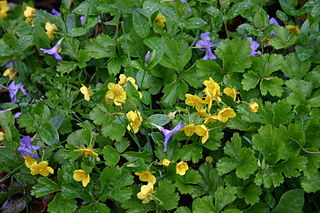
Waldsteinia fragarioides (syn. Dalibarda fragarioides Michx. and Geum fragarioides, also called Appalachian barren strawberry, or just barren strawberry, is a low, spreading plant with showy yellow flowers that appear in early spring. This plant is often used as an underplanting in perennial gardens.

Atriplex glabriuscula, common names Scotland orache, smooth orache, Babington's orache or seaside orach is an Atriplex species native to North America and northern Europe. It is an annual.
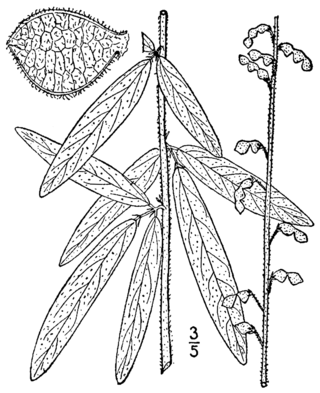
Desmodium sessilifolium, common name sessileleaf ticktrefoil, is a species of plant in the legume family, Fabaceae. It is native to North America.
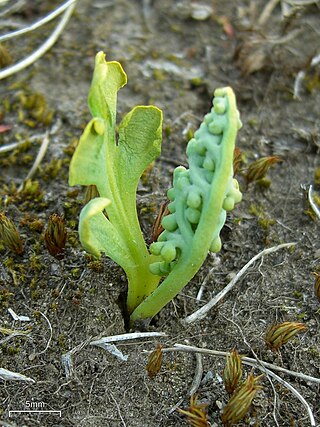
Botrychium simplex, the little grapefern, is a species of fern in the family Ophioglossaceae that is native to North America and Greenland. It is a perennial.
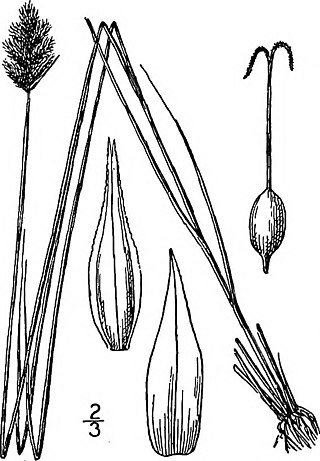
Carex crawfordii, common name Crawford sedge, is a species of Carex native to North America.

Juncus debilis, the weak rush, is a plant indigenous to the United States. It is listed as endangered in Massachusetts and New York, and as threatened in Rhode Island. It is listed as a species of special concern in Connecticut and believed extirpated in that state.
Linum intercursum, common names sandplain flax and sandplain wild flax, is a perennial plant native to the United States.
Crocanthemum dumosum, common names bushy frostweed and bushy rockrose, is a perennial plant that is native to the United States.
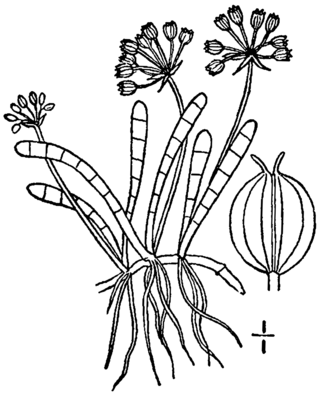
Lilaeopsis chinensis, common names eastern grasswort, eastern lilaeopsis, and lilaeopsis, is a plant that is native to North America.

Gamochaeta purpurea, the purple cudweed, purple everlasting, or spoonleaf purple everlasting, is a plant native to North America.
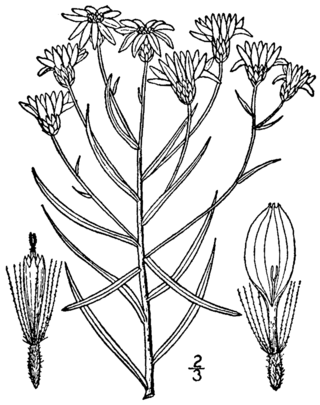
Pityopsis falcata, common names sickleleaf silkgrass and sickle-leaved golden aster, is perennial species of flowering plant in the family Asteraceae that is native to the United States and has been introduced to Canada.

Onosmodium virginianum, common names gravel-weed, wild Job's tears, false gromwell, and Virginia false-gromwell is perennial plant native to the eastern United States.

Cuscuta coryli, synonym Grammica coryli, common name hazel dodder, is a perennial plant in the Cuscutaceae family native to North America.

Carex typhina, common name cattail sedge, is a species of Carex native to North America.

Scleria verticillata, known as low nutrush or whorled nutrush, is a plant in the sedge family Cyperaceae. It is native to Ontario, Canada, the eastern United States, The Bahamas, and Cuba.

Trichostema brachiatum, commonly known as fluxweed or false pennyroyal, is a plant endemic to North America.

Ludwigia polycarpa, common names many-fruited false-loosestrife and false loosestrife seedbox, is a plant found in North America. It is listed as a special concern and believed extirpated in Connecticut, and as endangered in Massachusetts, Pennsylvania and Vermont.

Ludwigia sphaerocarpa, common names globe-fruited false-loosestrife, globefruit primrose-willow, round-fruited false-loosestrife, globe-fruited seedbox, globe-fruited ludwigia, spherical-fruited seedbox and round-fruited false loosestrife; is a plant found in North America. It is listed as endangered in Connecticut, Indiana, Massachusetts and Rhode Island, and as threatened in Michigan and New York (state). It is listed as extirpated in Pennsylvania.

Potamogeton hillii, common name Hill's pondweed, is a species of plant found in North America. It is listed as endangered in Connecticut, Ohio, and Pennsylvania. It is listed as a special concern in Massachusetts and as threatened in Michigan and New York (state).


















